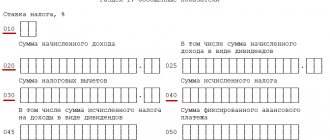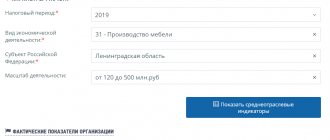In recent years, the organization of audit activities aimed at identifying violations of various articles of current legislation has been practiced by tax authorities much less frequently. Constant risk analysis of the activities of registered taxpayers allows you to track data in real time, so it makes sense to carry out such “actions” only after a sufficient base of indirect evidence indicating possible illegal actions has been collected. However, the regulatory procedure allows for such a possibility - and in this case it is better to know in advance what could serve as the basis on which it will depend on how long an on-site tax audit lasts, as well as what consequences it threatens.
General overview
The provisions of the regulatory Code do not provide a clear definition that would reveal the content of the concept of GNP. At the same time, the norms enshrined under Art. 82, 88-89 of the Tax Code of the Russian Federation, define the event in question as one of the forms of control, which is characterized by two key features. The first is to study the correctness of calculation and payment of mandatory fees to authorized bodies for a specific period of time (and this is the difference from a desk procedure focused on a specific declaration). The second is the possibility of the presence of department employees during an on-site tax audit on the territory listed as permanent or leased property of the subject.
Check duration
An on-site inspection cannot last more than two months. And if we are talking about an independent inspection of a branch or representative office, then no more than one month (Clause 7, Article 89 of the Tax Code of the Russian Federation).
The period of the on-site inspection can be extended with the permission of the regional tax service department up to four months, and in exceptional cases - up to six. These are the cases:
- if tax authorities check the largest taxpayers;
- if the company has a separate division;
- if taxpayers do not submit documents required for an on-site audit on time;
- if force majeure circumstances arise (flood, fire, etc.) in the territory where the inspection is carried out.
This list is not exhaustive. Which circumstance is considered exceptional and which is not is decided in each specific case by the regional department of the Federal Tax Service.
If the inspection is delayed, it is necessary to require the inspectors to present the decision of the regional department of the Federal Tax Service on its extension.
Possible reasons
In modern realities, such events are predominantly planned in nature - decisions on candidates are made based on the results of an analysis of the results obtained during the consideration of certain risk criteria. Most of them are in the public domain, and are enshrined in Federal Service Order No. [email protected] published in 2007. Let's look at the main options.
- Tax burden. Business entities whose performance indicators differ markedly from the industry average, published annually on the official website of the Federal Tax Service, come under close attention.
- Share of deductions for VAT refund. In this case, the criterion determining the list of applicants is exceeding the threshold of 89% of the total amount accrued for twelve months.
- Average monthly salary in terms of a full-time unit. The basis for the visit of tax officials is the provision of reports with data below the industry data. Analysis of information on a specific area of activity is carried out by territorial divisions of Rosstat, as well as by subject bodies of the Federal Tax Service.
- Economic profitability. A critical deviation from the norm is a result that lags behind the industry average by >10%. To assess the risk, it is enough to compare your own final business performance indicators with the information presented on the Federal Tax Service website.
- Balance sheet of profits and losses. Active growth of expenses in relation to income over a certain period is a reason for conducting tax audits, especially in cases where negative dynamics have been recorded for more than two calendar years.
- Involvement in trading operations of a chain of several counterparties. A systematic increase in the number of participants acting as intermediaries arouses suspicion among inspectors assessing the feasibility of such a scheme.
- Activities involving increased risks. This category includes transactions concluded with shell companies, hiring employees with disabilities, etc.
- Violation of the deadlines for submitting requested documentation or explanations to the Federal Tax Service, in particular within the framework of desk audits.
- Periodic change of the organization’s legal address, which results in “migration” between different regulatory agencies.
- Achieving the limits set aside for taxpayers applying special preferential regimes. Indicators are considered as an “approximation” if the difference with the official standard is five percent or less.
- Amount of deduction from professional activities. Private entrepreneurs using OSNO find themselves at risk in cases where the amount of compensation according to the declaration exceeds 83% of total income.
Ready-made solutions for all areas
Stores
Mobility, accuracy and speed of counting goods on the sales floor and in the warehouse will allow you not to lose days of sales during inventory and when receiving goods.
To learn more
Warehouses
Speed up your warehouse employees' work with mobile automation. Eliminate errors in receiving, shipping, inventory and movement of goods forever.
To learn more
Marking
Mandatory labeling of goods is an opportunity for each organization to 100% exclude the acceptance of counterfeit goods into its warehouse and track the supply chain from the manufacturer.
To learn more
E-commerce
Speed, accuracy of acceptance and shipment of goods in the warehouse is the cornerstone in the E-commerce business. Start using modern, more efficient mobile tools.
To learn more
Institutions
Increase the accuracy of accounting for the organization’s property, the level of control over the safety and movement of each item. Mobile accounting will reduce the likelihood of theft and natural losses.
To learn more
Production
Increase the efficiency of your manufacturing enterprise by introducing mobile automation for inventory accounting.
To learn more
RFID
The first ready-made solution in Russia for tracking goods using RFID tags at each stage of the supply chain.
To learn more
EGAIS
Eliminate errors in comparing and reading excise duty stamps for alcoholic beverages using mobile accounting tools.
To learn more
Certification for partners
Obtaining certified Cleverence partner status will allow your company to reach a new level of problem solving at your clients’ enterprises.
To learn more
Inventory
Use modern mobile tools to carry out product inventory. Increase the speed and accuracy of your business process.
To learn more
Mobile automation
Use modern mobile tools to account for goods and fixed assets in your enterprise. Completely abandon accounting “on paper”.
Learn more Show all automation solutions
Timing of the VNP
In accordance with current legislative norms, the duration of the audit is two months, the countdown of which begins from the date following the day the relevant decision was made. However, as practice shows, such events take much longer, which is due to the presence of a clause allowing the suspension or extension of the prescribed procedure. The second option is less common, since it requires the participation of management authorities, but the first option is used by tax authorities very willingly - for example, in the case of requesting documentation from counterparties.
Although formally an on-site tax audit cannot last more than 60 days, there are a number of legal grounds for extending the allotted period. These include:
- Appointment of an official examination.
- Sending a request to provide information to foreign authorities.
- The need for reliable linguistic translation of documents presented in another language.
Thus, the initially established time period can increase to nine months, which is very inconvenient for business. It is also worth noting that each such case must be formalized by a separate resolution of the senior employee of the Federal Tax Service (or his deputy), and during the “freeze” the organization of newly appointed control measures, as well as the putting forward of new demands to the taxpayer, is not allowed.
Suspending the scan
The on-site inspection begins on the day when the head of the tax inspectorate (or his deputy) made a decision on its appointment (clause 8 of Article 89 of the Tax Code of the Russian Federation). The inspection ends with the preparation of a certificate confirming its conduct. Inspectors must submit the certificate on the last day of the inspection.
An on-site audit may be suspended by decision of the head of the tax inspectorate (or his deputy). The decision to suspend an on-site tax audit of a consolidated group of taxpayers is made by the head (or his deputy) of the tax inspectorate that made the decision to conduct such an audit (clause 6 of Article 89.1 of the Tax Code of the Russian Federation). We list the reasons why a check may be suspended:
- it is necessary to obtain from the counterparty of the company being inspected documents that relate to its activities (agreements, payment documents, etc.);
- additional information from foreign government authorities is required;
- an examination needs to be carried out;
- It is required to translate documents submitted by the company in a foreign language into Russian.
Suspension of a tax audit on the first basis has a limitation. Namely: inspectors can, after interrupting the inspection, contact the same counterparty only once. They do not have the right to suspend the check for the second time because of the same partner.
Please note: while the audit is suspended, tax officials are required to return all original documents that were given to them. The exception is papers that were received by inspectors during the seizure. In addition, if the inspectors were on the territory of the company being inspected, they must leave it, ceasing all activities related to the audit.
At the same time, during the period of suspension of the audit, tax officials can interrogate employees of the audited company and call its representatives to give explanations. Such actions are legal if they are not carried out on the territory of the taxpayer.
The total period of suspension of the inspection cannot be more than six months. But there is one exception. If during this period the inspectors were unable to obtain a response from the foreign state, the suspension period may be extended for another three months.
The audit is resumed by the decision of the head of the tax inspectorate or his deputy.
Procedure and rules for conducting GNP
Legislative norms determine not only the duration and frequency of on-site tax audits, but also establish regulations for its implementation. The basis is the decision made by the inspectorate in which the subject is registered. The content should include information about the planned event, including the composition of the audit team, as well as specific fees and period that require clarification. At the same time, the Code does not establish an obligation to deliver a copy of the document to the taxpayer, although in practice the form contains a similar section and is usually provided before the start of the procedure.
During the audit, responsible inspectors send requirements, seize and inspect various types of materials, order expert studies and conduct interrogations of employees, as well as perform other actions necessary to achieve the result. The composition of the participants can be changed, but only if the corresponding entries are made in the content of the decision. On the final day, a documentary certificate is drawn up, reflecting the subject and timing of the tax inspection, and handed over to the taxpayer.
Delivery of the act
The inspection must give the organization its copy of the act within five working days from the date of signing the act (clause 5 of article 100, clause 6 of article 6.1 of the Tax Code of the Russian Federation).
The inspection can hand over the act:
- personally to the legal or authorized representative of the organization against signature. In this case, the authorized representative must have a power of attorney to represent the interests of the organization in the tax inspectorates;
- in another way indicating the date of receipt of the act by the organization (for example, through a courier service).
This follows from paragraph 5 of Article 100 of the Tax Code of the Russian Federation.
Upon receipt of the act, the representative of the organization must put two signatures on it:
- on receipt of the act (clause 5 of article 100 of the Tax Code of the Russian Federation);
- about familiarization with the contents of the act. If a representative of the organization refuses to sign the act (for example, due to his incompetence), then the corresponding note about the refusal to sign will be made in the act (clause 2 of Article 100 of the Tax Code of the Russian Federation).
Situation: to whom is the tax audit report handed over: the head office of the organization or its branches? The on-site tax audit was carried out simultaneously in relation to the head office of the organization and its branches.
When simultaneously inspecting the head office of an organization and its branches, the head office of the organization receives an on-site tax audit report.
Within five working days from the date of drawing up, the tax audit report must be sent to the organization in respect of which the audit was carried out, or handed over to its representative (clause 5 of Article 100 of the Tax Code of the Russian Federation). The document is drawn up in accordance with the order of the Federal Tax Service of Russia dated December 25, 2006 No. SAE-3-06/892.
The results of the branch inspection are documented by filling out the relevant sections of the single inspection report. After reading them, the relevant section of the act is signed by the head of the branch. This is stated in the Requirements approved by order of the Federal Tax Service of Russia dated December 25, 2006 No. SAE-3-06/892. At the same time, the order of the Federal Tax Service of Russia dated December 25, 2006 No. SAE-3-06/892 does not provide for the delivery of individual parts of the act (sections) to the branch of the organization. Therefore, a single inspection report is handed over to a representative of the organization’s head office (sent to the organization).
At the same time, the head office of the organization has the right to send to its branches extracts from the inspection report (copies of sections of the report) relating to its branches.
Similar explanations are contained in letters of the Ministry of Finance of Russia dated September 10, 2007 No. 03-02-07/1-406, Federal Tax Service of Russia dated March 19, 2007 No. CHD-6-23/216.
General procedure
In accordance with the established rules, the event is carried out on the territory of an office or facility owned by the subject - with the exception of situations where the available space does not allow providing employees with a separate room. However, most often, interaction occurs in absentia, using telecommunication channels or mail, through which requests for the provision of specific documentation are sent.
The procedure allows for the organization of interrogations of witnesses, which include both former and employed employees of the enterprise. The presence of the employer during the testimony scheduled within the main period of the on-site tax audit is prohibited. The location is determined depending on the current circumstances - the law allows communication with GNP participants both at workplaces and on departmental territory, and even in residential premises (but only with appropriate consent). Managers may also be questioned.
In addition, inspectors have the right to inspect premises, organize an inventory and seizure of documentation, as well as other objects, including removable media, hard drives and computer equipment. If necessary, examinations are appointed and specialized specialists are involved, including police officers ensuring the protection of law and order.
Making changes to the inspection report
Amendments to the inspection report must be agreed upon with the person being inspected.
Neither the Tax Code nor the Requirements say a word about the right of inspectors to make changes to the inspection report after it has been delivered to the person being inspected. At the same time, in fairness it must be admitted that there is no direct ban on such actions by controllers.
In addition, paragraph 2 of the Requirements states that blots, erasures and other corrections are not allowed in the act, with the exception of corrections agreed upon and certified by the signatures of the inspector (the head of the inspection group (team)) and the person being inspected (his representative). In this case, correction of errors in the act using a corrective or other similar means is not allowed.
It follows from the above that tax legislation does not grant the tax authority the right to independently make any changes and additions to the adopted tax audit acts and decisions. Similar conclusions are contained in the decisions of the FAS PA dated November 1, 2011 in case No. A55-3313/2011, FAS VSO dated October 31, 2008 No. A78-6071/07-S3-8/317-F02-5344/08 in case No. A78-6071 /07‑S3-8/317.
However, within the meaning of clause 2 of the Requirements, changes to the inspection report can still be made. We are talking here about the so-called technical errors made by the controllers themselves when drawing up the act. After all, correcting such errors is not associated with establishing new circumstances of the identified offenses. Accordingly, such actions of controllers do not violate the rights of the taxpayer and cannot lead to the adoption of an unlawful decision based on the results of the audit (see decisions of the FAS PO dated 03/28/2012 in case No. A12-3551/2011, FAS VSO dated 09/07/2010 in case No. A33- 14891/2009[1]). But in any case, amendments to the tax audit report (including for the purpose of correcting technical errors) must be agreed upon with the person being audited (clause 2 of the Requirements).
Does the period for preparing objections increase if changes are made to the inspection report?
In accordance with paragraph 6 of Art. 100 of the Tax Code of the Russian Federation, in case of disagreement with the facts set out in the tax audit report, as well as with the conclusions and proposals of the inspectors, within one month from the date of receipt of the tax audit report, the taxpayer has the right to submit written objections to the relevant tax authority on the specified act as a whole or on its individual provisions.
The period (10 days) allotted to clause 1 of Art. 101 of the Tax Code of the Russian Federation for making a decision based on the results of the inspection, begins to be calculated after the expiration of one month established by clause 6 of Art. 100 Tax Code of the Russian Federation.
At the same time, the Tax Code does not stipulate the consequences of changes made by the tax authority to the tax audit report.
According to the arbitrators, due to amendments to the on-site inspection report after its delivery to the taxpayer, the period for submitting objections to it should be calculated anew. If the decision based on the results of the inspection is made before the expiration of the newly calculated one-month period and without taking into account the objections of the person in respect of whom the inspection was carried out, this violates the requirements of Art. 101 of the Tax Code of the Russian Federation (see Resolution of the FAS UO dated 02.02.2010 No. F09-19/10-S2 in case No. A76-11291/2009-37-142[2]).
You should also pay attention to the Resolution of the Federal Antimonopoly Service dated June 25, 2012 in case No. A12-23020/2011. It says that in a situation where the inspection notified the audited person of changes in the act immediately on the day of consideration of the inspection materials, the taxpayer is deprived of the opportunity to submit appropriate objections. This circumstance is a violation of the essential conditions of the procedure for considering inspection materials (clause 14 of Article 101 of the Tax Code of the Russian Federation), entailing the cancellation of the decision made based on the results of the inspection.
How to prepare for an on-site tax audit
Targeted preparation for the GNP is practically impossible, since information on the implementation of such events is in closed access. The notice is provided by the controllers together with the primary demand sent via telecommunications or delivered during a personal visit.
However, businesses always have the opportunity to take a number of preventive measures to minimize possible negative consequences. Thus, competent organization of accounting, implemented with the help of software solutions offered by , provides the conditions necessary for full control over commodity transactions and eliminates errors and discrepancies with counterparties.
Another important aspect is the availability of legal support provided by an in-house lawyer or external lawyers in the event that employees or the head of the enterprise are called for questioning. Constitutional provisions provide for the possibility of refusing to testify, as well as limiting the information provided to the scope of publicly available information. Understanding the legislation, in principle, plays an important role - knowing what the maximum duration of an on-site inspection of an organization is, you can always point out the non-compliance of the implemented procedure with regulatory requirements.
Periodic local audits carried out by outsourcing companies bring practical benefits. A third-party accounting assessment helps to promptly identify existing errors that could lead to problems with regulatory authorities.
GNP results
It was previously said that on the day of completion of the planned event, a certificate is drawn up and provided to the taxpayer. It is this that serves as the basis for the transition to the formalization of the official results of the audit.
The period for conducting an on-site inspection cannot exceed two months and is calculated from the moment the relevant decision is made. A similar period is allocated by the legislator for drawing up an act containing a list of detected offenses and serving as the basis for prosecution. The resulting document, supplemented by attachments, must be signed by the subject. Refusal of the standard procedure has no practical meaning, since the presence of a signature does not mean automatic agreement with the proposed content, and at the same time excludes the possibility of its subsequent adjustment, since one copy remains at the disposal of the taxpayer.
In situations where the head of the organization deliberately avoids delivering the audit report, the materials are sent by registered mail to the legal address and are considered received by default six days from the date of sending.
Preparation of objections (if any) is carried out in writing. An appeal is allowed on individual points, or on the results of the GNP as a whole. A month is allotted for compilation, after which the provided materials are reviewed at an open event, which requires the mandatory invitation of a representative of the interested party. Violation of this part of the regulations by tax authorities, as well as deprivation of the opportunity to provide explanations on the case, is an unconditional basis for the cancellation of a previously rendered verdict.
The final decision may be interim or final. In the first case, additional procedures are prescribed, such as expert analysis, interrogation, or collection of documentation from participating counterparties, necessary to form a sufficient evidence base. The second situation obliges the Federal Tax Service Inspectorate to provide a detailed analysis of the subject’s arguments, including objections within the framework of open consideration, and justify their acceptance or refusal.
Taking into account the time frame for the on-site inspection, the time allotted for receiving new clarifying materials seems quite sufficient - one month. In this case, extension is excluded from the list of additional options, as well as the search for new violations. After the expiration of the period, the regulations require the appointment of similar proceedings.
Taking into account the current situation caused by the coronavirus pandemic, the legislator allows for the implementation of a number of activities, including the consideration of an appeal, using telecommunications and video communications. To use this opportunity, it is enough to submit the appropriate application, attaching copies of documents confirming the legal status and identity of the subject.
Repeated on-site tax audit
There are three situations in which regulatory authorities can once again conduct an IRR in relation to fees and insurance premiums that have previously been audited:
- Quality control of the work of the inspection commission, implemented by a higher department. At the same time, such a procedure is not carried out to refute previously drawn up acts confirming the results of verification activities, that is, it does not aim to eliminate procedural or factual errors identified during the consideration of a legal dispute in court.
- Providing a clarifying declaration containing the amount of tax deduction for periods previously subject to audit. The actions of the regulatory authority, which is the Federal Tax Service Inspectorate, are limited to re-verification of the data stated as the appropriate basis.
- Registration or liquidation of a legal entity.
Thus, GNP is a fairly large-scale and complex procedure that can significantly complicate the functioning of a business.
Considering how long an on-site tax audit can last, and what is the general period of suspension of business activities on legal grounds, it is best to understand in advance the legal nuances that determine the powers of controllers and taxpayers. Understanding the criteria for selecting candidates for the implementation of such planned activities, as well as timely monitoring of the organization’s performance indicators, minimizes the likelihood of communication with representatives of the inspection. Number of impressions: 540
On-site tax audit in 2022: list of features
If you or your organization has become the object of attention of the tax authorities and received a notification of an on-site tax audit in 2021, you need to familiarize yourself with the features of such an audit:
- An on-site tax audit can be carried out only at the location of the taxpayer (except for the cases specified in paragraph 2, 3, paragraph 2 of Article 89 of the Tax Code of the Russian Federation);
- the main purpose of the audit is to establish whether taxes and insurance premiums were calculated correctly, and whether they were paid on time (clauses 4, 17 of Article 89 of the Tax Code of the Russian Federation);
- the main document confirming the start of an on-site tax audit is the decision to conduct it (clause 1 of Article 89 of the Tax Code of the Russian Federation);
- the period under review cannot exceed 3 years (clause 4 of Article 89 of the Tax Code of the Russian Federation);
When a tax audit can cover a period exceeding 3 years, read the materials “A repeated on-site audit can be “deeper” than 3 years” and “Can the current year be checked along with the previous three?”
- a taxpayer cannot be audited more than once for the same taxes for the same period;
There are several situations - exceptions when the Tax Code allows repeated inspections. All of them are described here. Let us note a new one that has appeared since 07/01/2021 - this is the submission of clarification on VAT or excise taxes with an increase in the amount of tax to be reimbursed (clause 10 of Article 89 of the Tax Code of the Russian Federation as amended by Law No. 470-FZ dated December 29, 2020).
- only one on-site inspection can be carried out per calendar year (with the exception of when the decision to repeat the inspection is made by the head of a higher tax authority of the Federal Tax Service of the Russian Federation);
- an on-site inspection cannot be assigned in relation to a special declaration (clause 2 of Article 89 of the Tax Code of the Russian Federation), which an individual has the right to voluntarily submit to the Federal Tax Service about the property he has (real estate, transport, deposits in banks or in the authorized capital of organizations), as well as about foreign companies controlled by him.







